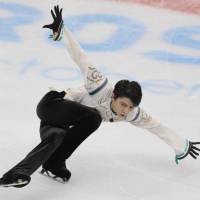The big extravaganza in Pyeongchang is over now and what a show it was. In every category, the skating performances were simply amazing.
Yuzuru Hanyu and Shoma Uno in the men's, Alina Zagitova, Evgenia Medvedeva, Kaetlyn Osmond and Satoko Miyahara in the women's, Aljona Savchenko and Bruno Massot in pairs, Tessa Virtue and Scott Moir and Gabrielle Papadakis and Guillaume Cizeron in ice dance.
For skating fans, it was an intensive period of the world's best on the sport's grandest stage. For those of us who were fortunate enough to be there, it was even more than that.
Day after day a cavalcade of stars in competition and at practice, all in the very same place. For skating aficionados, it was nirvana.
On the final day of the Pyeongchang Games, I spoke with two-time Olympic bronze medalist (Lillehammer — 1994, Nagano — 1998) Philippe Candeloro of France about Hanyu at Gangneung Ice Arena.
Even though several days had passed since Hanyu won his second straight Olympic gold medal, the skating community was still in awe of what the Sendai native had accomplished.
I asked Candeloro, who worked for French TV at the Olympics, what he thought of the 23-year-old superstar.
"For me, I always say he is an 'alien' and 'alien guy,' " Candeloro stated. "He is the first to have done many things and also he is the two-time Olympic champion.
"I spoke to him yesterday and asked him, 'What are you going to do now? Are you going to be a professional? Or are you going to continue?'
"His reply to me was only to laugh and say, 'I want to do a quad axel.'"
Candeloro saw Hanyu's comment as an indication that the two-time Olympic gold medalist is nowhere near retiring from competing.
"This means he is probably going to continue two or four more years to try to be the first man to realize the quad axel in competition," Candeloro commented.
I asked Candeloro, who is still popular in Japan to this day, where he ranked Hanyu among the all-time great skaters.
"I think he is one of the best skaters of the 21st century," Candeloro said. "Technically, we have never seen a guy like this, and he is very strong. After the injury he had in the beginning of the season, and then he comes back after just three weeks of jumping, he is incredible."
Candeloro then bemoaned the loss of the transcendent stars skating has boasted in the past.
"Since 2000, we have started losing charismatic skaters in every category," Candeloro noted. "Like we don't have a great program to remember. We already can't remember four years ago what he (Hanyu) has done in Sochi, except in his country, because he is like a god.
"The Japanese have a very long memory, so they remember exactly what he did," added Candeloro. "The program, every jump, where the jump was, and the spin and everything.
"But all around the world, it is more difficult to remember. So we are missing some great programs like people remember more, the atmosphere of the program, than the jumps they have made."
Ice Time was in the White Ring that magical night in Nagano in February of 1998 when Candeloro put on a fantastic show to "D'Artagnan" in taking the bronze. When fans left the arena, they weren't talking about gold medalist Ilia Kulik or silver medalist Elvis Stojko, they were talking about Candeloro.
When I mentioned his swashbuckling program of yesteryear, Candeloro demurred.
"It is difficult to talk about myself, but last night we had an interview with Katarina Witt and when she did 'Carmen,' people remember it. People remember 'Bolero' from (Jayne) Torvill and (Christopher) Dean. Also, the Duchesnays, (Isabelle and Paul), the brother and sister team (ice dancers from France), made many good memories."
Candeloro reiterated his admiration for the skaters of the present day, while expressing concern that skating's artistry is being lost.
"They give us a very good sport now. We have a lot of very, very good athletes right now on the ice," Candeloro stated. "But with the rules we lost the artistic impression, where the public can have some remarks about the skaters and remember them."
Kihira heads to world juniors
The action picks up again this week with the world junior championships in Sofia. Triple axel queen Rika Kihira headlines the Japan team for the event.
Kihira, a 15-year-old from Nishinomiya, Hyogo Prefecture, will be looking to improve on her fourth-place finish at the Junior Grand Prix Final in Nagoya in December and make the podium in her first trip to world juniors.
Kihira is coached by Mie Hamada, whose stable at Kansai University includes Satoko Miyahara, Marin Honda and Yuna Shiraiwa.
Joining Kihira in the women's field are rising star Mako Yamashita, a 14-year-old from Nagoya, and Yuhana Yokoi, 17, who also hails from Nagoya. Both are making their first trip to world juniors.
With three first-timers, Japan's team is vastly different from last season's world juniors when Honda, Kaori Sakamoto and Shiraiwa comprised the team. Honda came home with the silver and Sakamoto the bronze, behind Zagitova.
Kihira will have her hands full as she battles Russia's Alexandra Trusova and Alena Kostornaia, the gold and silver medalists at the JGP Final.
Japan has just two spots in the men's field and they will be taken by Japan junior champion Mitsuki Sumoto and runner-up Sena Miyake.
Sumoto, the bronze medalist at the JGP Final, will go up against Americans Alexei Krasnozhon, the winner of this season's JGP Final, and Camden Pulkinen, who was second in Nagoya, and Tomoki Hiwatashi.
Pairs Riku Miura and Shoya Ichihashi will represent the Hinomaru in Bulgaria, while Haruno Yajima and Daiki Shimazaki will make up the ice dance team.
The competition gets underway on Wednesday with the short dance and pairs short program.
Watanabe provides insight
Ice Time reached out to Emi Watanabe, Japan's first world female skating medalist for her thoughts on Pyeongchang and how Japan's women skaters can close the gap on the Russians.
Watanabe expressed concern about the increasing physical toll the sport is taking on the young athletes due to excessive jumping.
"Many of the skaters including Medvedeva, Yuzu and Satoko have had big injuries and had to take time off," Watanabe wrote in an email. "Figure skating is not a contact sport, but many skaters are injured. I think the rules need to be changed in order for the skaters not to overdo it on their bodies."
Watanabe said that while the multiple revolution jumps look good for the audience, there is a price to be paid for it.
"As a skating fan it is exciting to see the triples and the quads," Watanabe noted. "But as a former skater I know how much the body is strained when you practice the big jumps. In my day we practiced 6-8 hours a day, but we also had the compulsory figures."
Watanabe acknowledged that the Russian women were a cut above in South Korea.
"It was exciting to see the Russian girls compete at such a high level and entertaining," Watanabe remarked. "The Japanese girls were in the top six, but you could see the height of jumps and the presentation was at a different level.
"Years ago Midori Ito had the height in her jumps, including the triple axel, which was sensational," Watanabe wrote. "If Satoko hadn't skated perfect I would not have been disappointed, but she skated the performance of her career at the Olympics and no medal was expected.
"It will take a while for the Japanese girls to take over the podium. Hopefully soon."
Mao set for touring show
Last week it was announced that three-time world champion Mao Asada will be pulling on the boots again for a tour throughout Japan. The 27-year-old star will be joined on the "Mao Thanks Tour" by her sister Mai.
Mao's agent Mariko Wada told Ice Time how the tour came about.
"Mao was going to put away her skates last summer after her retirement skating show," Wada wrote in a email to Ice Time. "But she thought about what she wanted to do in the near future, then we came up with some ideas. Mao thought she should visit and meet fans, then skate for the people who had supported her at all of the competition venues, skating show venues or even those watching on TV at home."
Wada said the decision was then made to identify places that did not have such easy access to see skating.
"We decided to select the cities in which skating events are rarely held," Wada revealed. "Mao asked her sister Mai to join Mao's new project. Mao has selected her favorite programs from her entire career.
"From there the concept of the tour became, 'Mao delivers her thanks throughout Japan' to the areas where the shows will take place and the ticket prices will be very reasonable."
Wada added that Mao struggled to come up with a name for the tour.
"Mao kept thinking about the title of this skating show as something like a jewelry box or treasure box, with all the memories inside," Wada wrote. "But finally decided "Mao Thanks Tour" for everybody to easily understand."
The schedule for the tour is as follows:
May 3-4 (Niigata), June 2-3 (Nagano), July 21-22 (Sapporo), Aug. 18-19 (Ibaraki), Sept. 8-9 (Saitama), Sept. 22-23 (Yamanashi), Oct. 13-14 (Fukushima), Oct. 20-21 (Kanagawa), Oct. 27-28 (Fukuoka), Nov. 3-4 (Hiroshima).
Further information will be available on the tour website: maotour.jp
Hanyu's class act
Ice Time had a chance to watch a replay of NBC's coverage of the men's free skate from Pyeongchang in the past few days, and there was a moment that resonated that many may not have seen.
As the skaters waited in a back room for the competition to end, it was Hanyu, Jin Boyang and Nathan Chen seated in three chairs as the top three on the leaderboard at the time.
When Javier Fernandez and Shoma Uno were done skating, thereby knocking Jin and Chen off the podium, Hanyu took the time to console and encourage both his Chinese and American counterparts before they departed.
Here was Hanyu, in his finest hour, where he had every right to think only of himself, yet he took on the role of elder statesman for his younger competitors.
It was yet another incredible Yuzu moment.


















With your current subscription plan you can comment on stories. However, before writing your first comment, please create a display name in the Profile section of your subscriber account page.